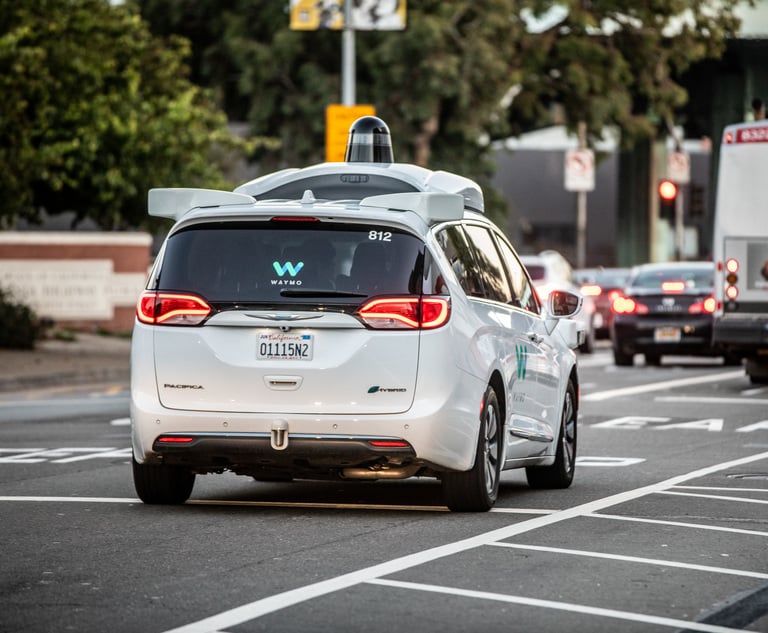Big Law Partner Joins Lobbying Blitz Against Pro-Employee 'Dynamex' Bill
Monday's call was put together by a coalition of business organizations and companies, including Lyft and Uber, eager to keep their workers classified as independent contractors.
July 01, 2019 at 05:53 PM
4 minute read
 Arnold & Porter Kaye Scholer offices in Washington, D.C.
Arnold & Porter Kaye Scholer offices in Washington, D.C.
Making ride-hailing drivers employees under California's wage-and-hour laws would be akin to “trying to fit a square peg into a round hole,” the head of Arnold & Porter Kaye Scholer's labor and employment group said Monday.
David Reis, speaking to reporters on a call organized by opponents of a bill to codify parts of the California Supreme Court's 2018 ruling in Dynamex, said the state's hours-based work statutes don't mesh with the flexibility that Lyft and Uber say their drivers want.
“We're dealing in a legislative employment law regime in California that is really quite rigid, quite paternalistic, [and] does not allow for the type of flexibility and economy that have become so attractive in the gig economy,” said Reis, a San Francisco-based partner. “And so trying to make these folks an employee and apply an employment regime that was based on the traditional employee is just not going to work.”
Opponents of the legislation have launched a lobbying and social media blitz as the bill races towards its final scheduled policy committee hearing next week. Uber and Lyft spent more than $336,000 combined on lobbying state policymakers in the first quarter of 2019, with AB 5 listed in public filings as one of the companies' main advocacy targets.
Monday's call was put together by a coalition of business organizations and companies, including Lyft and Uber, eager to keep their workers classified as independent contractors. The Dynamex decision, particularly if codified under Assembly Bill 5, would make it much more difficult for gig companies to avoid making their workers employees subject to the same overtime, meal-and-rest period and payday scheduling rules that apply to more traditional workplaces.
Reis was joined on the call by four ride-hailing drivers from around the state who said the provisions of Assembly Bill 5 would eliminate their ability to work when they want, care for loved ones and earn extra income to pay off bills.
The New York Times reported Saturday that large labor groups have been negotiating with Uber and Lyft over a possible deal to exempt ride-hailing drivers from AB 5's provisions. The bill's author, Assemblywoman Lorena Gonzalez, D-San Diego, responded Saturday by tweeting that the two companies “have yet to explain why we would ever exempt them out of #AB5 – not wanting to follow labor laws is NOT a valid reason.”
“I understand the difference between employment status, a real [collective bargaining agreement] & everything less,” Gonzalez said. “I did not run for office to sell out workers.”
Gonzalez and her allies have argued that California's employment laws do not bar employers from adopting flexible schedules for their workers.
The assemblywoman has taken amendments to exempt certain classes of professional workers, including licensed insurance agents, certain medical workers, lawyers, investment advisers, real estate licensees and hair stylists.
Reis, who is not representing Uber, Lyft or the employers' coalition, according to a coalition spokeswoman, said state payday laws would hurt gig workers who want to be paid in real time.
“Under the California Labor Code you have to designate in advance a payday and you have to have regular payday,” he said. “And so to pay somebody on a daily basis really wouldn't work under the current wage-and-hour laws.”
Read more:
California AB5 Leaves Gig Companies' In-House Counsel in Labor Law Limbo
9th Circuit: 'Dynamex' Worker Classification Test Applies Retroactively
Gig Companies' Lawyers 'Welcome' New US Labor Opinion Letter
This content has been archived. It is available through our partners, LexisNexis® and Bloomberg Law.
To view this content, please continue to their sites.
Not a Lexis Subscriber?
Subscribe Now
Not a Bloomberg Law Subscriber?
Subscribe Now
NOT FOR REPRINT
© 2025 ALM Global, LLC, All Rights Reserved. Request academic re-use from www.copyright.com. All other uses, submit a request to [email protected]. For more information visit Asset & Logo Licensing.
You Might Like
View All
California's Chief Justice Starts Third Year With Questions About Fires, Trump and AI
4 minute read
Willkie Farr & Gallagher Drives Legal Challenge for Uber Against State's Rideshare Laws
5 minute read

California Lawmakers Reach $50M Deal to Fund Legal Fights Against Trump
3 minute readTrending Stories
- 1'A Death Sentence for TikTok'?: Litigators and Experts Weigh Impact of Potential Ban on Creators and Data Privacy
- 2Bribery Case Against Former Lt. Gov. Brian Benjamin Is Dropped
- 3‘Extremely Disturbing’: AI Firms Face Class Action by ‘Taskers’ Exposed to Traumatic Content
- 4State Appeals Court Revives BraunHagey Lawsuit Alleging $4.2M Unlawful Wire to China
- 5Invoking Trump, AG Bonta Reminds Lawyers of Duties to Noncitizens in Plea Dealing
Who Got The Work
J. Brugh Lower of Gibbons has entered an appearance for industrial equipment supplier Devco Corporation in a pending trademark infringement lawsuit. The suit, accusing the defendant of selling knock-off Graco products, was filed Dec. 18 in New Jersey District Court by Rivkin Radler on behalf of Graco Inc. and Graco Minnesota. The case, assigned to U.S. District Judge Zahid N. Quraishi, is 3:24-cv-11294, Graco Inc. et al v. Devco Corporation.
Who Got The Work
Rebecca Maller-Stein and Kent A. Yalowitz of Arnold & Porter Kaye Scholer have entered their appearances for Hanaco Venture Capital and its executives, Lior Prosor and David Frankel, in a pending securities lawsuit. The action, filed on Dec. 24 in New York Southern District Court by Zell, Aron & Co. on behalf of Goldeneye Advisors, accuses the defendants of negligently and fraudulently managing the plaintiff's $1 million investment. The case, assigned to U.S. District Judge Vernon S. Broderick, is 1:24-cv-09918, Goldeneye Advisors, LLC v. Hanaco Venture Capital, Ltd. et al.
Who Got The Work
Attorneys from A&O Shearman has stepped in as defense counsel for Toronto-Dominion Bank and other defendants in a pending securities class action. The suit, filed Dec. 11 in New York Southern District Court by Bleichmar Fonti & Auld, accuses the defendants of concealing the bank's 'pervasive' deficiencies in regards to its compliance with the Bank Secrecy Act and the quality of its anti-money laundering controls. The case, assigned to U.S. District Judge Arun Subramanian, is 1:24-cv-09445, Gonzalez v. The Toronto-Dominion Bank et al.
Who Got The Work
Crown Castle International, a Pennsylvania company providing shared communications infrastructure, has turned to Luke D. Wolf of Gordon Rees Scully Mansukhani to fend off a pending breach-of-contract lawsuit. The court action, filed Nov. 25 in Michigan Eastern District Court by Hooper Hathaway PC on behalf of The Town Residences LLC, accuses Crown Castle of failing to transfer approximately $30,000 in utility payments from T-Mobile in breach of a roof-top lease and assignment agreement. The case, assigned to U.S. District Judge Susan K. Declercq, is 2:24-cv-13131, The Town Residences LLC v. T-Mobile US, Inc. et al.
Who Got The Work
Wilfred P. Coronato and Daniel M. Schwartz of McCarter & English have stepped in as defense counsel to Electrolux Home Products Inc. in a pending product liability lawsuit. The court action, filed Nov. 26 in New York Eastern District Court by Poulos Lopiccolo PC and Nagel Rice LLP on behalf of David Stern, alleges that the defendant's refrigerators’ drawers and shelving repeatedly break and fall apart within months after purchase. The case, assigned to U.S. District Judge Joan M. Azrack, is 2:24-cv-08204, Stern v. Electrolux Home Products, Inc.
Featured Firms
Law Offices of Gary Martin Hays & Associates, P.C.
(470) 294-1674
Law Offices of Mark E. Salomone
(857) 444-6468
Smith & Hassler
(713) 739-1250






